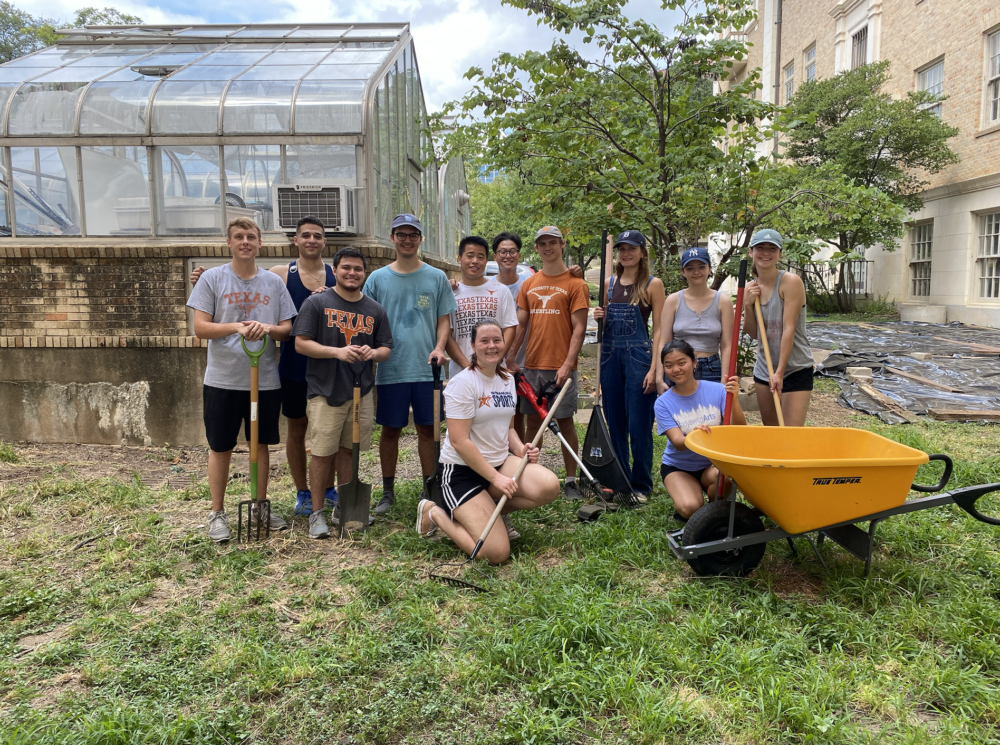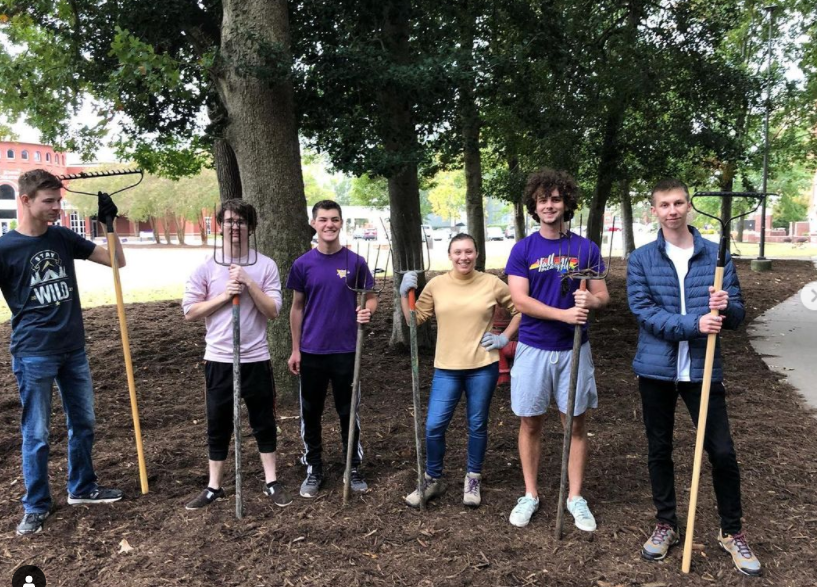The beauty of Bee City USA and Bee Campus USA is its community building: the murals, weed pulls, garden tours, plant sales, and pocket meadows serve so many functions beyond pollinator health and education. These activities join us to each other and our environment, and there is an inherent value in this connectivity. We hope you find strength in these relationships. You are creating a remarkable community.
Many affiliates had their projects interrupted in the past two years due to Covid-19, but looking through the 2021 affiliate reports, it is so impressive to see what was collectively accomplished in that time — and encouraging to see plans getting back on track. There are a lot of dedicated, creative minds working to protect pollinators. And these projects reflect the personality and talents of each community. What an inspiration!
As Bee City USA and Bee Campus USA continue to grow, we will support your efforts with informative pollinator conservation and pesticide reduction resources, and will work to help you connect with your fellow affiliates. Below is a snapshot of what you all achieved in 2021. Feel free to reach out to each other to build upon each other’s great work. We have a wealth of knowledge in our community.
Thank you for growing with us!
Warmly,
Laura Rost and the Bee City USA and Bee Campus USA team
2021 Bee City USA and Bee Campus USA Affiliates Snapshot
2021 City and Campus Stats:
- Pollinator-related community events: 1,652
- Attendees at pollinator conservation events: 115,045
- Pollinator habitat projects implemented: 938
- Acres of pollinator habitat created or enhanced: 1,156
- Pollinator habitat volunteers: 8,323
- People engaged in pollinator conservation through community events, volunteer activities, habitat projects, training courses, continuing education, and service learning: 158,926
2021 Campus-Only Stats:
- Service learning projects to enhance pollinator habitat on and off-campus: 195
- Students in those service learning projects: 2,929
- For-credit courses that included pollinator-related information: 791
- Students in those for-credit courses: 27,011
- Number of continuing education courses including pollinator-related information : 129
- Number of participants in those continuing education courses: 5,618
2019 to 2021 City and Campus Growth
Area of pollinator habitat created or enhanced:
2019: 2,168 acres
2020: 477 acres
2021: 1,156 acres
Number of pollinator-related community events:
2019: 1,233
2020: 812
2021: 1,652
Total: 3,697
People engaged in pollinator conservation through community events, volunteer activities, habitat projects, training courses, continuing education, and service learning:
2019: 845,539
2020: 72,073
2021: 158,926
Total: 1,076,538
Number of Bee City USA affiliates at end of year:
2019: 101
2020: 124
2021: 149
Number of Bee Campus USA affiliates at end of year:
2019: 89
2020: 106
2021: 129
Total number of affiliates (city + campus) at end of year:
2019: 190
2020: 230
2021: 278
2021 Bee City USA Activities:
- Pesticide reduction tools: Support Pollinator Conservation by Reducing or Eliminating Pesticide Use in Your Community
- We launched our No Mow May (and beyond No Mow May) efforts: Welcome Pollinators to your Lawn with No Mow May
- We highlighted a study showing the cost-benefit analysis of becoming a Bee Campus USA affiliate: The Economics Support Bee Campus USA Certification
A Quick Look Back:
2012: Bee City USA was founded by Phyllis Stiles, with the first affiliate, Asheville, NC.
2015: Phyllis launches Bee Campus USA, to expand to college and university campuses, with the first campus affiliate, Southern Oregon University.
2018: Bee City USA and Bee Campus USA become initiatives of the Xerces Society for Invertebrate Conservation.
Highlights of our 2021 Affiliate Annual Reports
Work Parties and Habitat Installations



Indiana University Purdue University Indianapolis (IUPUI) Cultural Trail bioswale. Along the Cultural Trail outside of IUPUI’s Innovation Hall, a 2000-ft-long bioswale was installed by the university’s grounds department. This long, channeled depression receives rainwater runoff and has vegetation such as pollinator-friendly asters and organic matter to slow water infiltration and filter out pollutants.

The City of Gillette, WY has implemented pollinator-friendly beautification projects as well as monarch habitat. They supply approximately 1,000 flats of pollinator-friendly flowers to plant throughout the city with their Adopt a Planter Volunteer Program. The City recently added more than 150,000 sq. ft. of water-conserving turf, trees, and pollinator-friendly perennials.

Planting the new Food Forest on the campus of James Madison University in Harrisonburg, VA. Approximately 60 people came out for the planting with an estimated 45 students participating. The planting of the understory layers, including root crops, herbs, ground cover, and other pollinator plants is expected to begin in 2022.

Madison, WI: Weeding in native planted median. In 2021, the Engineering Department continued with efforts to convert suitable medians to either shortgrass prairie or to low-mow bee lawn.

Raritan Valley Community College Food Pantry’s new mini pollinator garden in New Jersey. The Campus Cares volunteer planting program was up and running again in 2021. Approximately 25 volunteers planted native pollinator plants in planters in the Enabling Garden, Science courtyard, and in front of the main entrance, Theater, Student Center, Food Pantry, and Workforce Development building. The college also had native pollinator plants, shrubs, trees, and grasses planted in the Atrium and by the Events Center. An American holly tree was planted by the Childcare Center’s butterfly garden. Four native oaks were planted along the main roadway. Students planted native trees on and off campus.

In Ohio, Wright-Patterson Air Force Base staff and volunteers collected 17 pounds of native seeds from Huffman Prairie. The seeds are redistributed throughout 112+ acres of natural areas to aid in the restoration and enhancement of this native habitat. An annual prescribed burn is also conducted on Huffman Prairie (approximately a quarter of the prairie each year) to assist in controlling invasive species and to improve the biodiversity of native plants. In 2021 volunteers removed 16+ acres of invasive species and planted approximately 60 acres of native pollinator habitat in areas previously mowed. Five monarch waystations are continuously maintained and enhanced on the installation.

Pollinator habitat at Hive Market at Lichten Plaza in Raleigh, NC.
Educational Signage

Grow Zones at Hobart and William Smith Colleges (Geneva, NY) are designed to be low maintenance and reduce time needed compared to cutting the grass. No cutting, weeding, or watering is performed on them. In two Grow Zones the wildflowers flourished, while the other two had sparse flowers growing mixed with the grass. The colleges will continue to seed the Grow Zones until they are able to grow wildflowers every year by themselves.

Close-up image of the Grow Zone sign developed by Hobart and William Smith Colleges.

The University of Texas Rio Grande Valley posted signs in the Pollinator Cantina Garden that include common names in both English and Spanish.


Auburn University (AL) installed informative signs around the campus. The range of signs / informational posters shared in 2021
included this one to protect a native bee nesting site; a sign featuring Auburn’s Bee Campus USA designation; and signs on how to connect with the Auburn University Bee Lab for more information on research. The campus outreach efforts also include a variety of social media posts about pollinators.

Southern Oregon University (Ashland, OR) displays a Xerces Society Pollinator Habitat sign.
Education

In 2021, the University of North Texas (Denton, TX) hosted two BioBlitzes for pollinator research and education. One was co-hosted by student members of the UNT Bee Campus Committee in the university’s Community Garden. The second was hosted by UNT Bee Campus member Dr. Baxter-Slye at the Pecan Creek Pollinative Prairie, a space dedicated to North Texas natives with over 700 documented species. Both events helped document what pollinators are using these spaces and inform us of more native species to plant. Two Digital Design classes from the UNT College of Visual Arts and Design created tote bags for the UNT Community Garden. As a part of this process, students within these classes took a tour of the garden and learned about the various functions of pollinators within the space. Dr. Baxter-Slye also hosted various educational tours at the Pecan Creek Pollinative Prairie.

Native bee expert and insect macro-photographer, Sam Droege, visited Asheville, NC, to give a presentation on regional bee diversity and conservation through Bee City USA – Asheville.

Olbrich Botanical Gardens holds a virtual pollination class in Madison, WI.
Events and Activities

The Bee City USA committee in Talent, OR, certifying one of 13 new pollinator gardens in town. This small community now has a total of 73 certified pollinator gardens — quite remarkable!

The Bee City USA committee of Beaumont, TX, spreading the word!

University of Vermont‘s Beekeeping Club, in conjunction with the UVM Horticulture Club, held a joint “seed ball” making event. Seeds of pollinator-friendly annuals (sunflowers) and perennials (coneflower, black-eyed susan, coreopsis, and bee balm) were distributed in the 1-acre meadow surrounding the apiary on campus.

The end-of-year Bee City USA committee potluck in Asheville, NC. Phyllis Stiles, who founded Bee City USA in 2012, is seated on the floor. Although retired from running the program, she remains active in her hometown.





